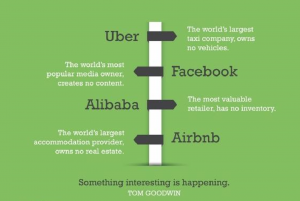 So I’ve seen the above photo floating everywhere on the internet, and I decided to look into it more to see if it linked to the digital space that we live in. I never knew what phenomena this was, but upon my research, I learned that is is something called the Sharing Economy. What is the sharing economy you ask?
So I’ve seen the above photo floating everywhere on the internet, and I decided to look into it more to see if it linked to the digital space that we live in. I never knew what phenomena this was, but upon my research, I learned that is is something called the Sharing Economy. What is the sharing economy you ask?
“A people’s economy based on ‘access to’ rather than ‘ownership of’ physical and human aspects like time, space, and skills.”
The Sharing Economy is an emerging phenomena of peer-to-peer sharing of access to certain goods and services rather than requiring direct ownership. Trends such as car sharing, p2p traveling, and social lending are all by-products of the Sharing Economy. The Sharing Economy is the result of emerging social technologies (ie: mobile apps) that have consequently enabled users to connect like never before!
So why do I share this? Well, as I looked into this phenomena, I learned that it all started because of the digital era we live in. Mobile apps have allowed us to migrate to this so-called sharing economy. Now, as you can see, the Sharing Economy heavily relies on technology and mobile platforms that make it easier for peers to connect with each other. That said, these P2P platforms create the potential for marketers to insert algorithms to track not only consumer and seller behaviour, but also the science behind ‘matches’ (ie: What preferences to the buyer/seller have? What is their consumption/selling pattern and who do they most do business with? Who do they trust?). By tracking such behaviour and exploring how consumers/sellers ‘trust’ one another, marketers may be able to create more tailored campaigns (ie: creating a campaign for BMW executed by a marketer who also loves BMWs).
Platforms used to host the Sharing Economy also unlocks the potential for micro-targeting. Since these P2P networks are very community focused, marketers can create more grassroots brand-building approaches and allow communities to experience their brands, rather than wasting money doing mass-marketing. By tapping into the technologies used for collaborative consumption, marketers can better invest their efforts to smaller groups of people. Doing so can allow marketers to enable more brand ambassadors within the community and share more content (ie: between seller [brand advocate] and buyer [consumer]).
In my opinion, in order for the Sharing Economy to be sustainable and successful, trust is needed. Therefore, we can predict that, if the Sharing Economy continues to be successful, consumers will be demanding more transparency in order to trust what is being marketed to them. Therefore, things such as peer reviews and trials can potentially be of even more importance in the marketing realm.
Finally, despite backlash from corporations and the government, the Sharing Economy is unavoidable. This type of economy allows people to conveniently access goods and services without compromising cost, engage in experiences they may not otherwise pursue, and create efficiency to their day-to-day lives. Even if it becomes unsuccessful and unsustainable, it is only a matter of time that our economy shifts towards a model that is similar, especially given the fact we are entering a completely digital era.